Can't figure this thing out
-
I've modeled several knife switches for various models, they're usually pretty straight-forward, but this one baffles me. I cannot figure out the purpose of all the extra parts and pieces, what the heck the springs are there for, etc. It reminds me of what the government would come up with when asked to design one.
Anyhow, just thought I would throw it out here and see if some of you much more knowledgeable people might shed some light on this. I'm probably just overlooking something obvious, but hey, you never know 'till you ask.
It's not essential for the model that I understand this, but I do like to figure out things if at all possible.
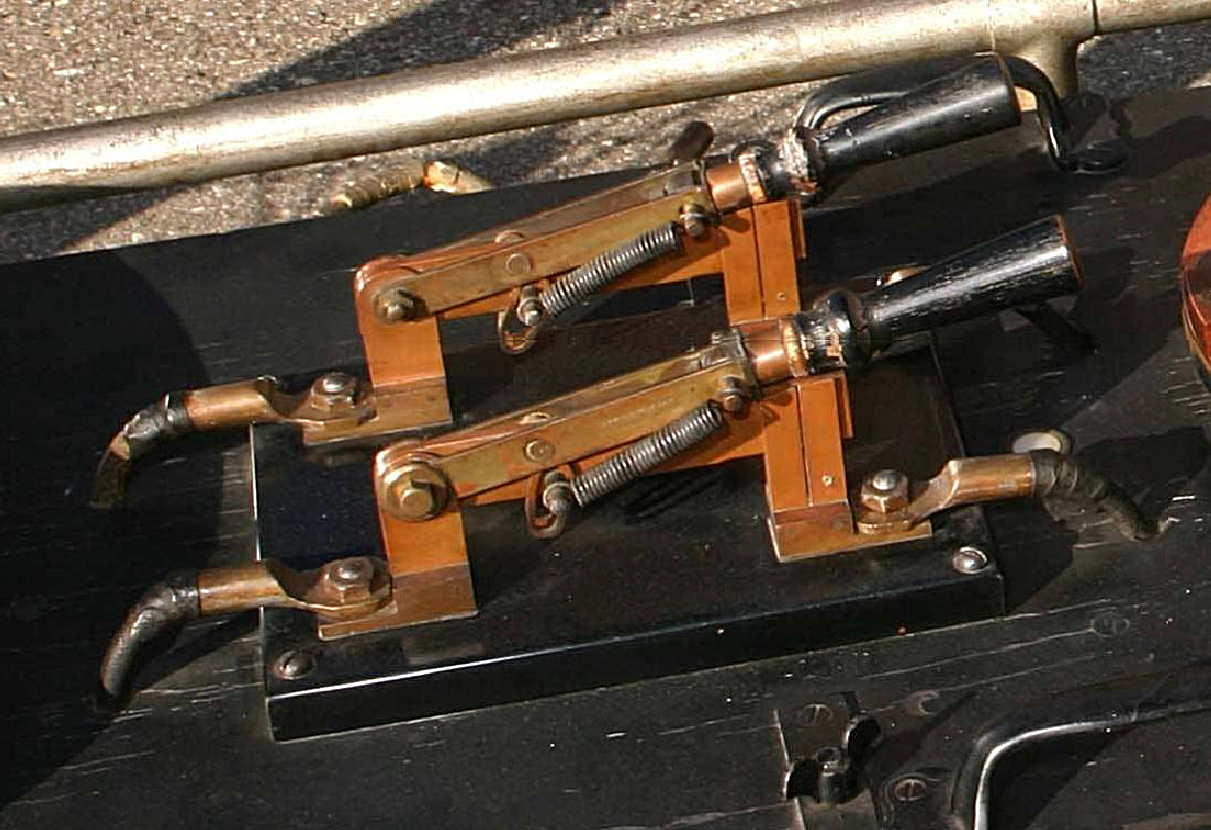
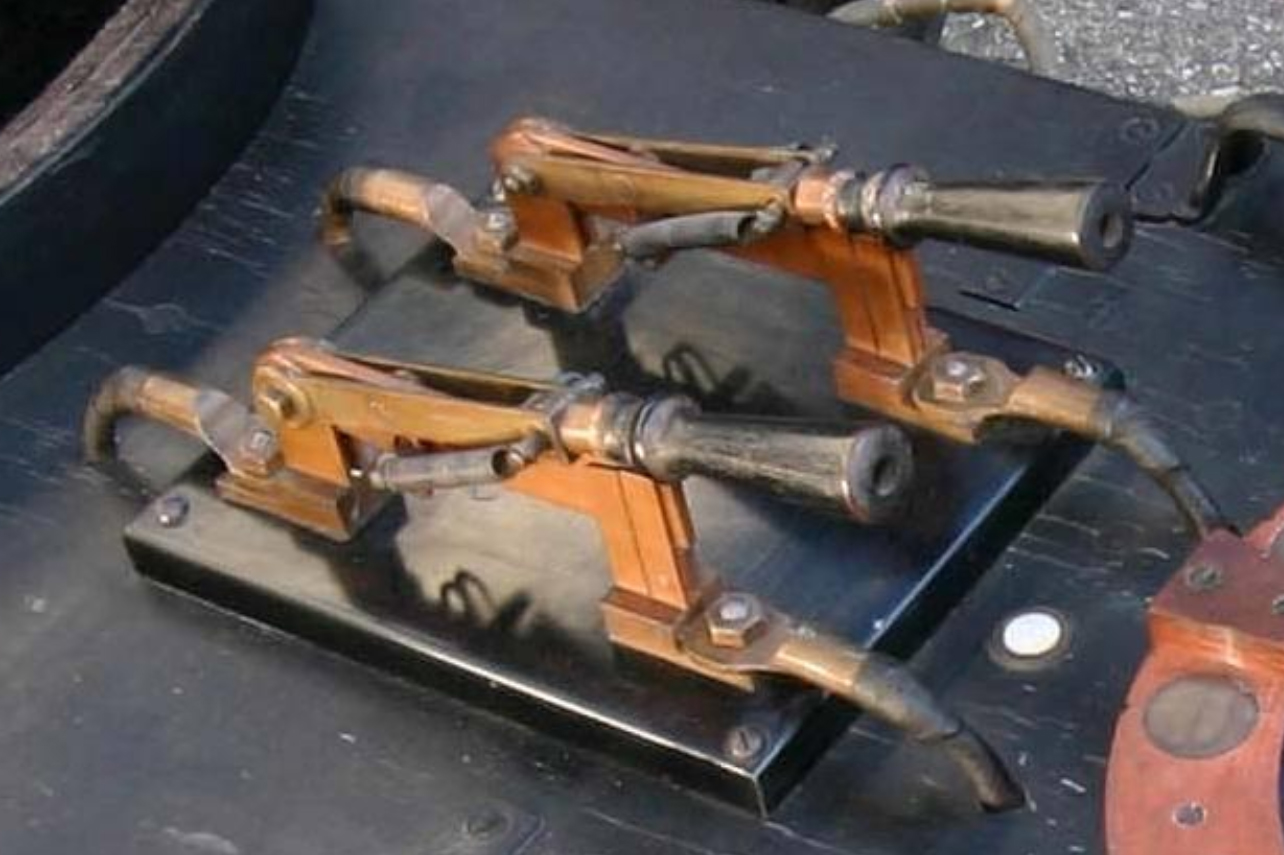
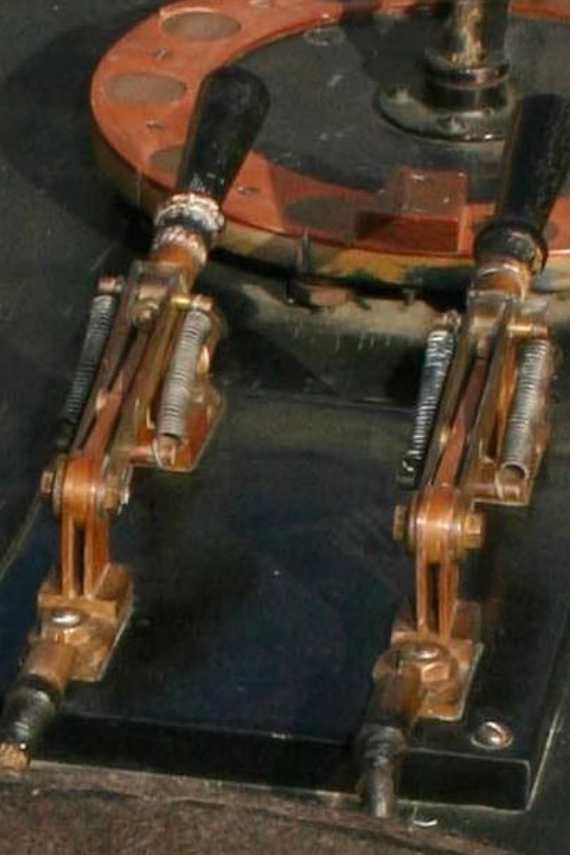
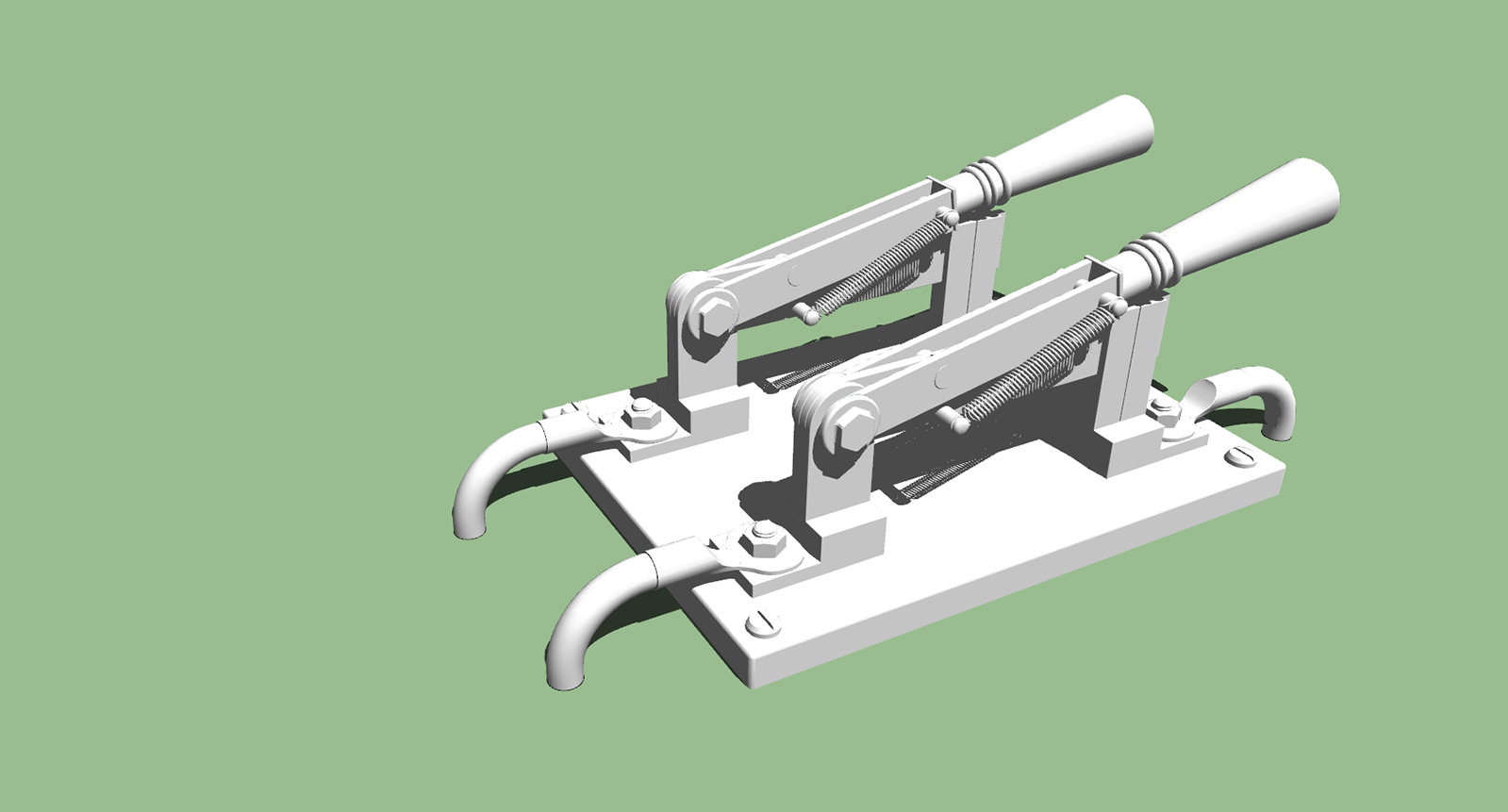
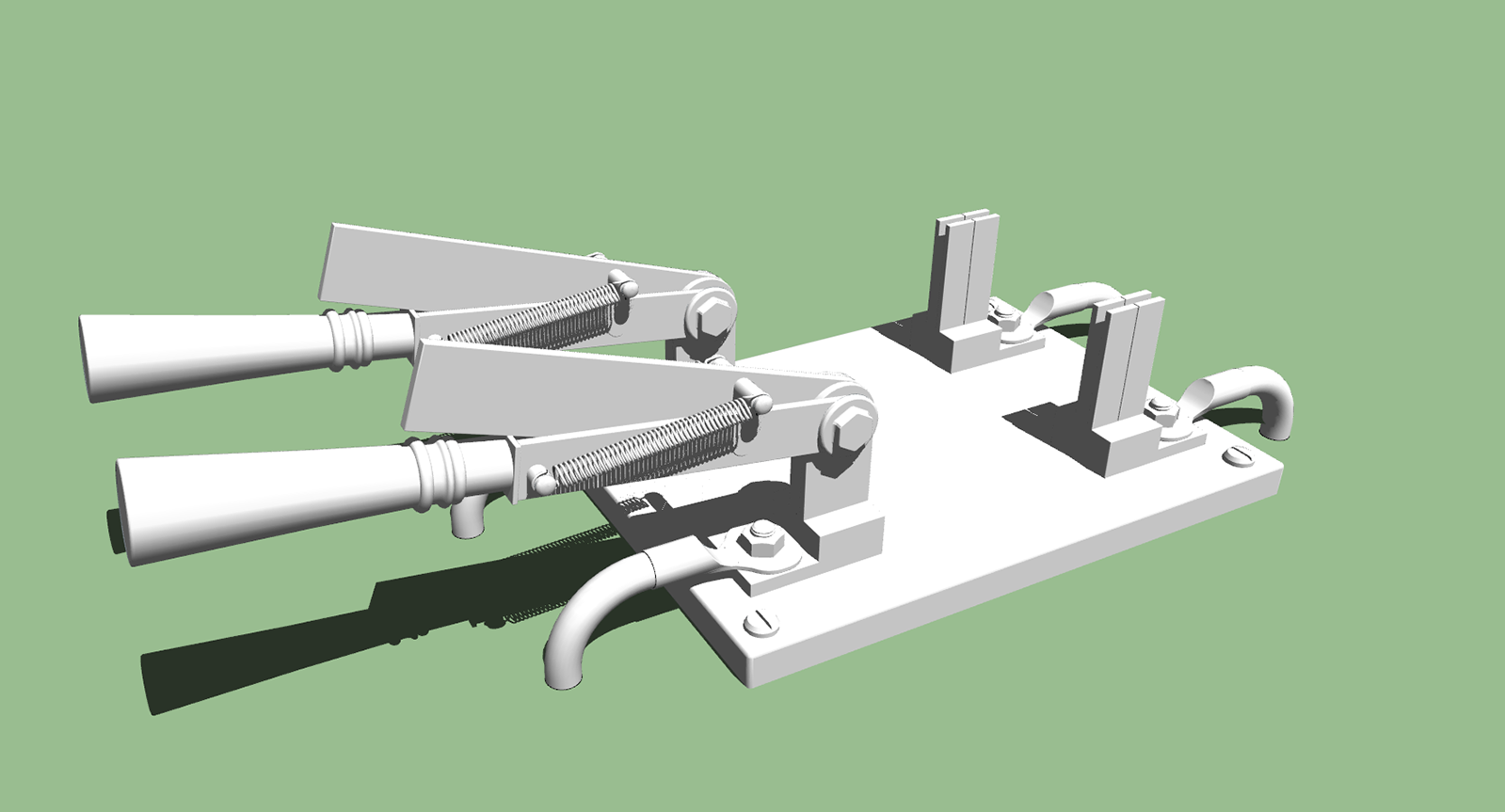
Seems like they could have simplified the construction and achieved the same result --
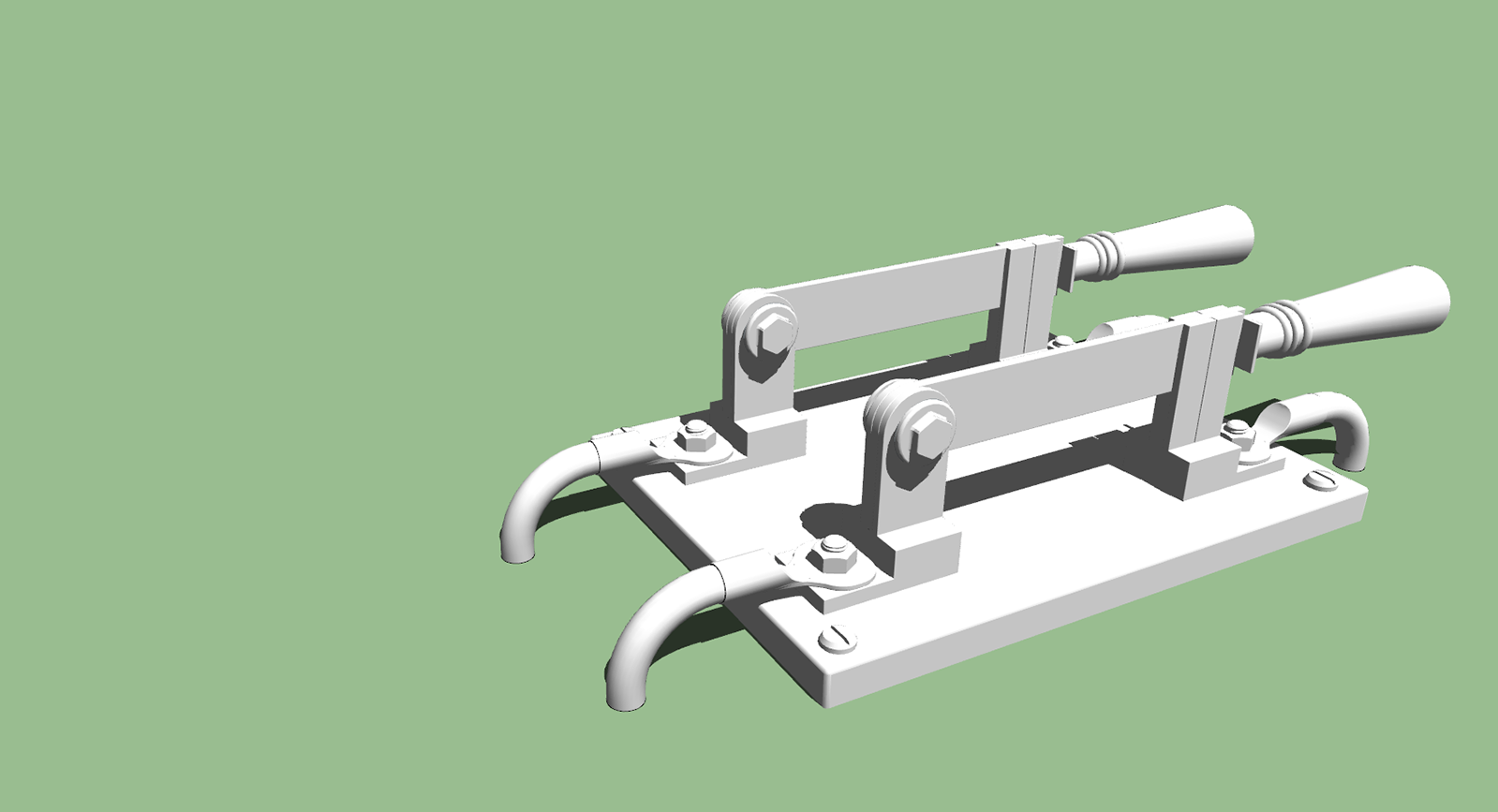
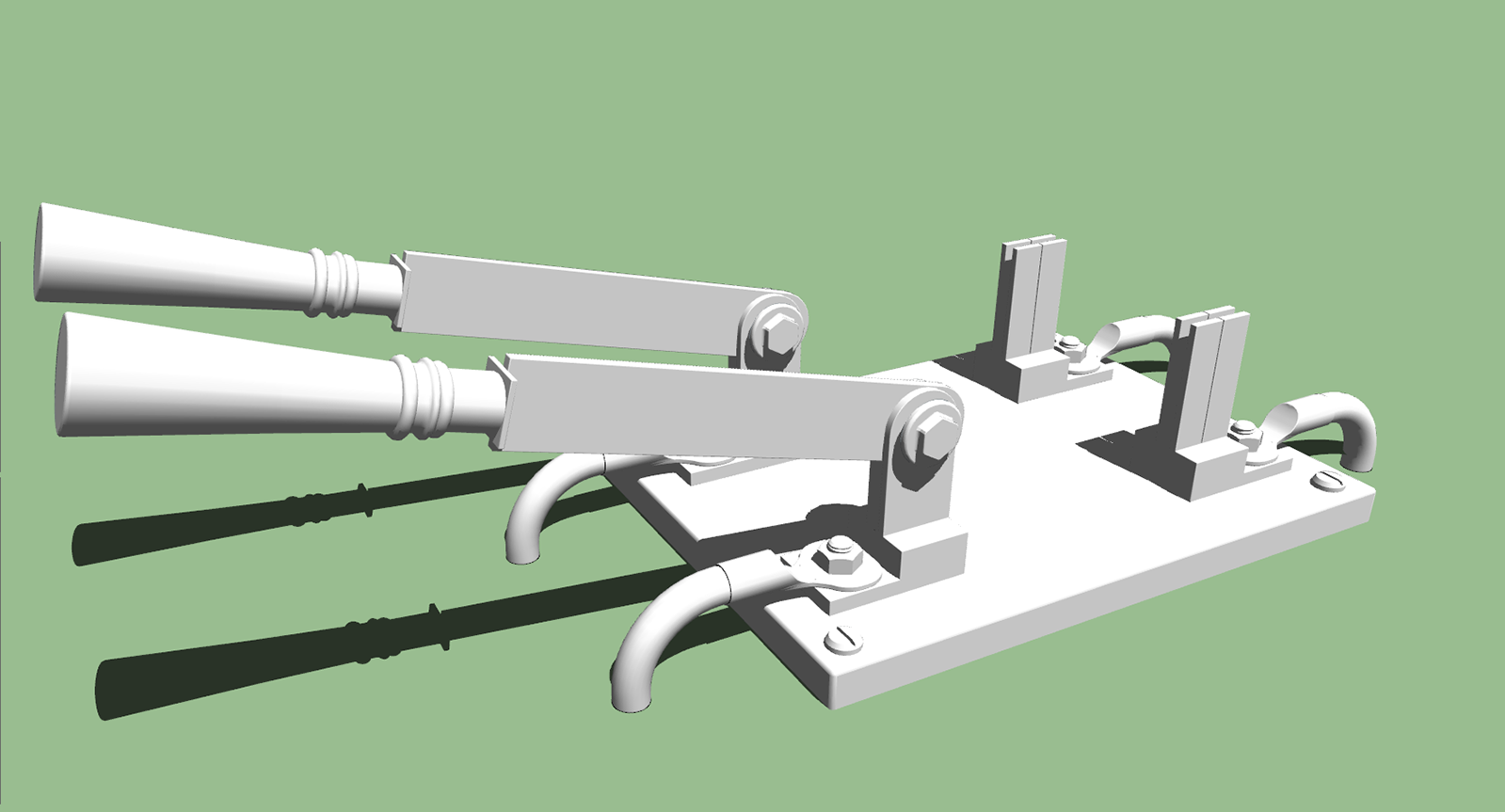
-
such great modeling!
-
@dave r said:
The handles would need to be lifted a fair amount to open the switches. This would prevent the switch from being accidentally opened. When it does disconnect it would be instantaneous.
Yes, but the handles would have to be raised the same amount in either configuration, with the same instantaneous disconnect. My question is why they felt it was necessary to include all the extra stuff, when as far as I can tell it serves absolutely no useful purpose.
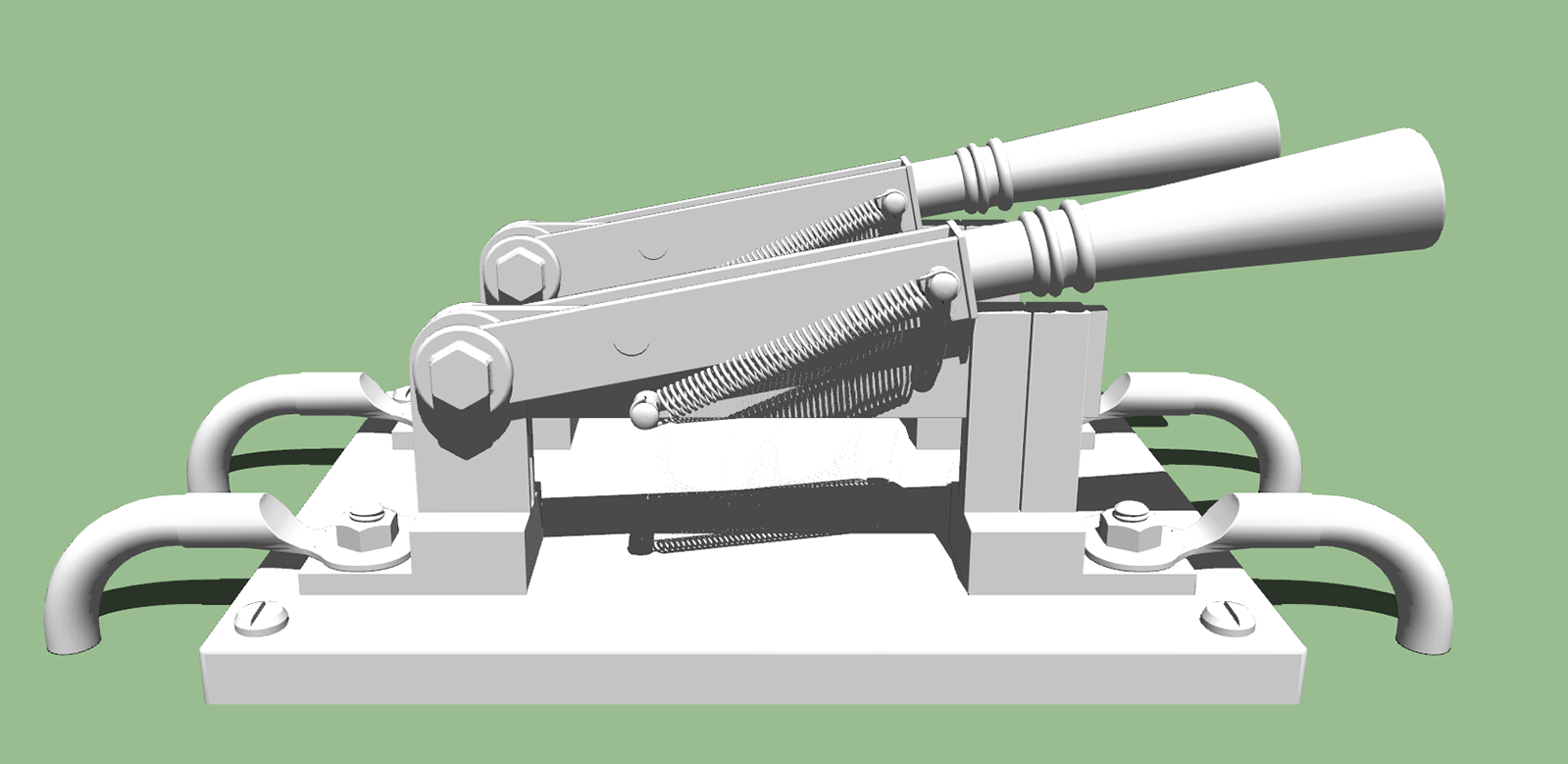
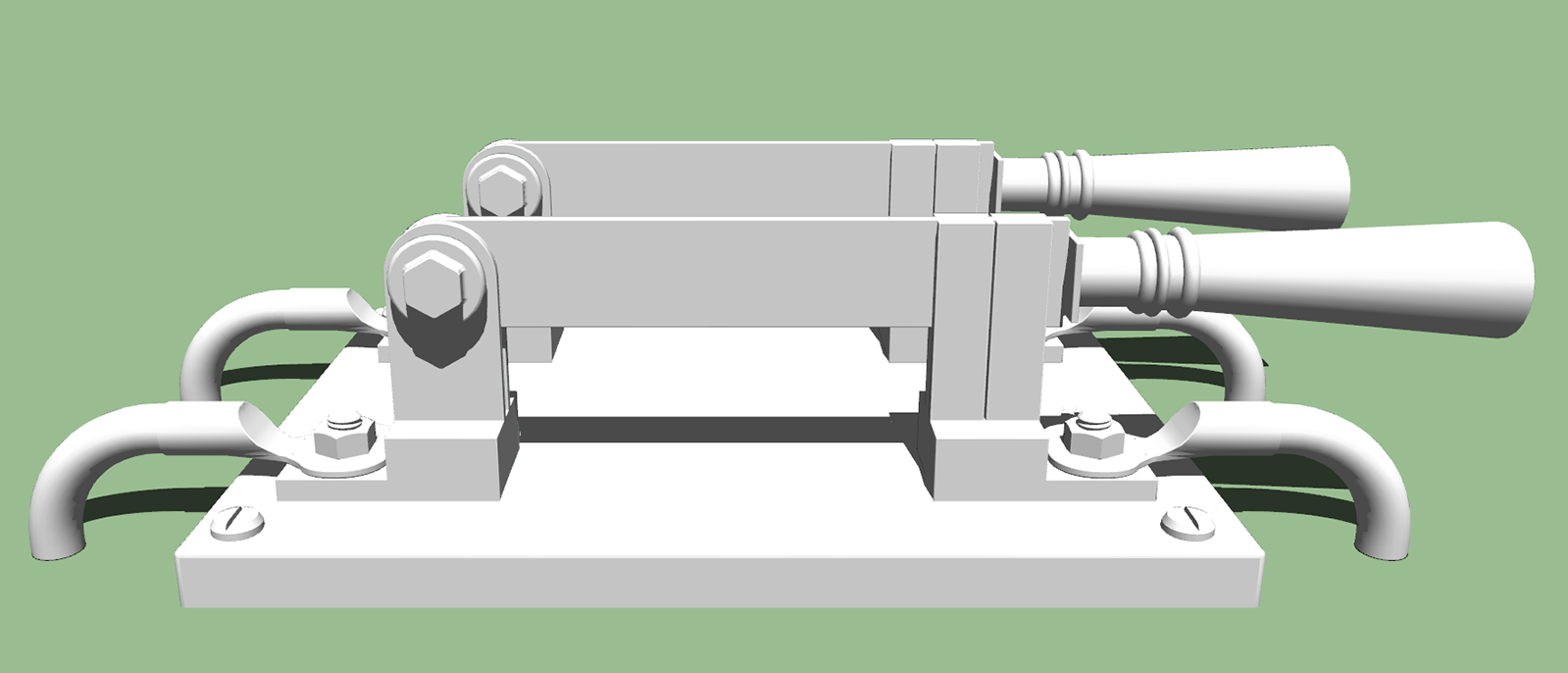
-
-
Does that platform move? Maybe the springs are there to keep the switch from falling open if it's tilted past vertical. Edit - maybe not, I don't see that it would serve that purpose.
-
@andybot said:
Does that platform move? Maybe the springs are there to keep the switch from falling open if it's tilted past vertical. Edit - maybe not, I don't see that it would serve that purpose.
No, it stays horizontal (it it did go vertical that would not be good, it's part of a 1901 vehicle
 )
)Plus, there is a pin (A) that runs through everything to hold the parts together, that's one reason I cannot figure out the purpose of the spring.
Also could not figure out what the heck this (B) is, and why it's there.
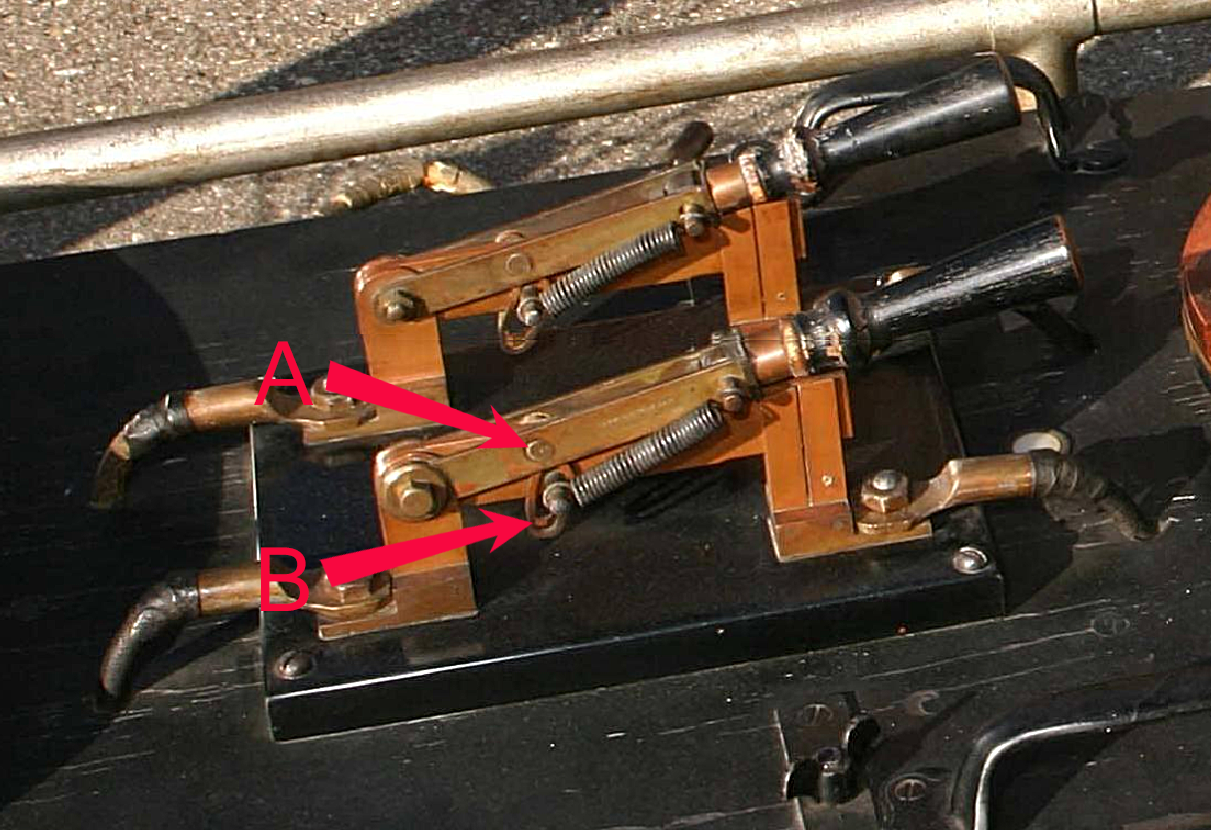
-
Double blades for carrying extra current and the springs stop the switch from accidentally closing from vibration etc.
-
The springs and A and B are used to open the switch quick after some preload on the spring.
This should prevent serious arcing at the contact points. -
I've been racking my brain cell for an answer but have no clue. Very nice construction Steve, as usual. When can we see the rest?
-
@box said:
Double blades for carrying extra current and the springs stop the switch from accidentally closing from vibration etc.
Box, unless I'm reading this wrong (entirely possible), this entire assembly moves as one piece, with a pin (A) connecting the main parts together. If that is correct, the springs would serve no purpose. The bar (B) is the only part that completes the electrical connection, the other parts serve no purpose in that.
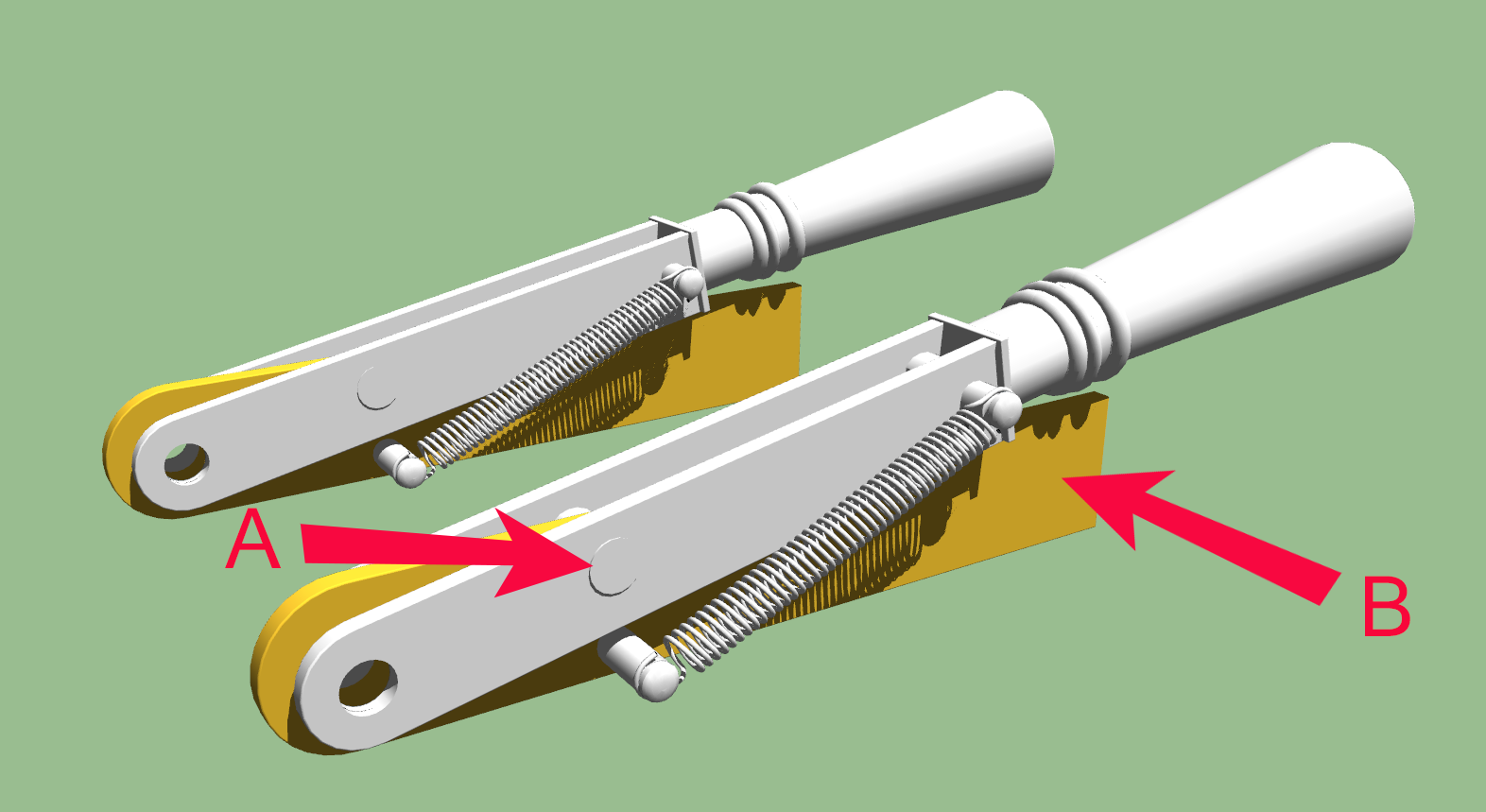
I have done extensive searches for single-pole single-throw knife switches, every single one is very simple, essentially the same as this
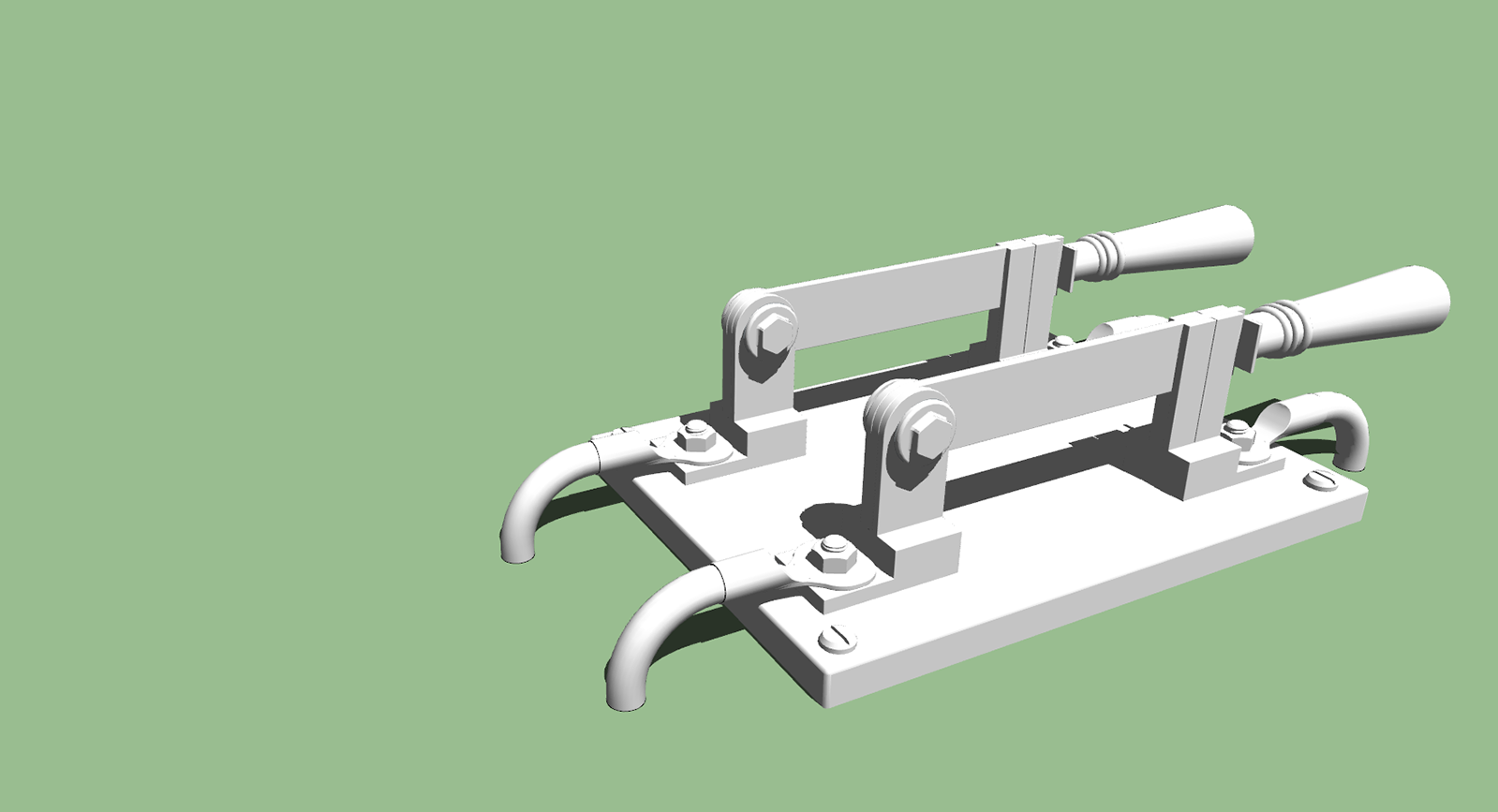
That is all that is needed to open and close the connection (hey, it worked well in all the Frankenstein laboratories).
Again, my assumptions could be all wrong, I haven't completed my electrical engineering degree (mainly due to the fact that I never started it) and I don't have many photos to work from and they don't show the switch from enuf angles to be certain about everything.
Also, these switches control the power to two large electric motors, each providing power to the rear wheels on the vehicle. I don't know if that's a factor, and it was built in 1901 so their way of thinking might have been different then.
I will use the switches as I have modeled them, no choice there. I know that sometimes I get too caught up in my models and my curiosity bogs down the creative process, but hey, for me it adds to the fun. Bottom line, I'm just weird.
-
@bep said:
The springs and A and B are used to open the switch quick after some preload on the spring.
This should prevent serious arcing at the contact points.Bep, you seem to know a lot more about this sort of thing than I do, but please see my reply to Box's post above for my take on this thing.
-
@mike amos said:
I've been racking my brain cell for an answer but have no clue. Very nice construction Steve, as usual. When can we see the rest?
Hey Mike,
Well, the model was pretty much finished (or so I thought). But it had been several years since I had looked at the thing, and when I revisit a model I like to do a search to see if any more useful photos have surfaced, and in this case a number of photos of much higher quality were indeed now available. So I need to do a lot of work on it to take advantage of all the new info and details. The fun never stops at the Hellnbak Weird Car Factory.
Steve
-
Its a single blade switch
The springs and the red parts are essential parts of the designs of the switch.
The red parts are probable riveted to the handle.Wen you open the switch, you first load the spring to some tension.
Then the red part hooks under the pin in the switch blade.
Wen moving the handle further the switch blade starts sliding out off its contact.
At some point the loaded spring will with great speed pull the blade out off, and further away from its contact.
The sparking is minimized by speed with witch the blade moves away from its contact.
Now the switch can be fully opened.Wen closing the switch, the blade is pushed in between its contact by the round brass part just under the handle.
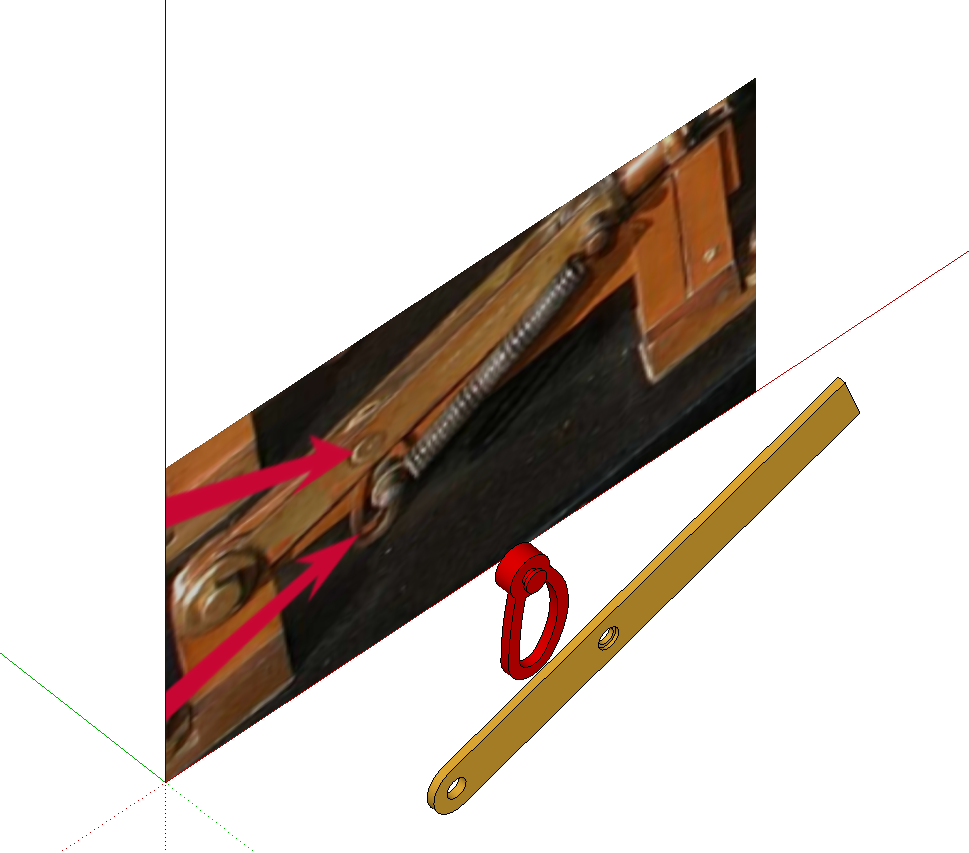
red part.skp -
Ah - that would make the most sense - it has to do with how you open or close the switch and prevent arcing. The separate handle allows you to move your hand away from the switch, and the spring flicks the switch open once it gets a certain amount of tension on it.
-
@andybot said:
Ah - that would make the most sense - it has to do with how you open or close the switch and prevent arcing. The separate handle allows you to move your hand away from the switch, and the spring flicks the switch open once it gets a certain amount of tension on it.
The sole purpose off this design is to prevent as far as much the current from arching.
The switch blade and contact would otherwise burn fast.
This design makes the contact of the switch open at a fast speed, undependable off the speed with witch the operator opens the switch. -
Bep,
Well, I got one thing right - I told you that you knew a lot more about this sort of thing than I do

My mistake was assuming that the pin went all the way thru the parts and connected them together, so that they had to move as a unit. Also had no idea that arcing was such a big problem with this type of switch.
So, at this point the spring has tension and the red part has made contact with the pin, and further movement of the handle will begin to slide the blade out of its contact. Right?
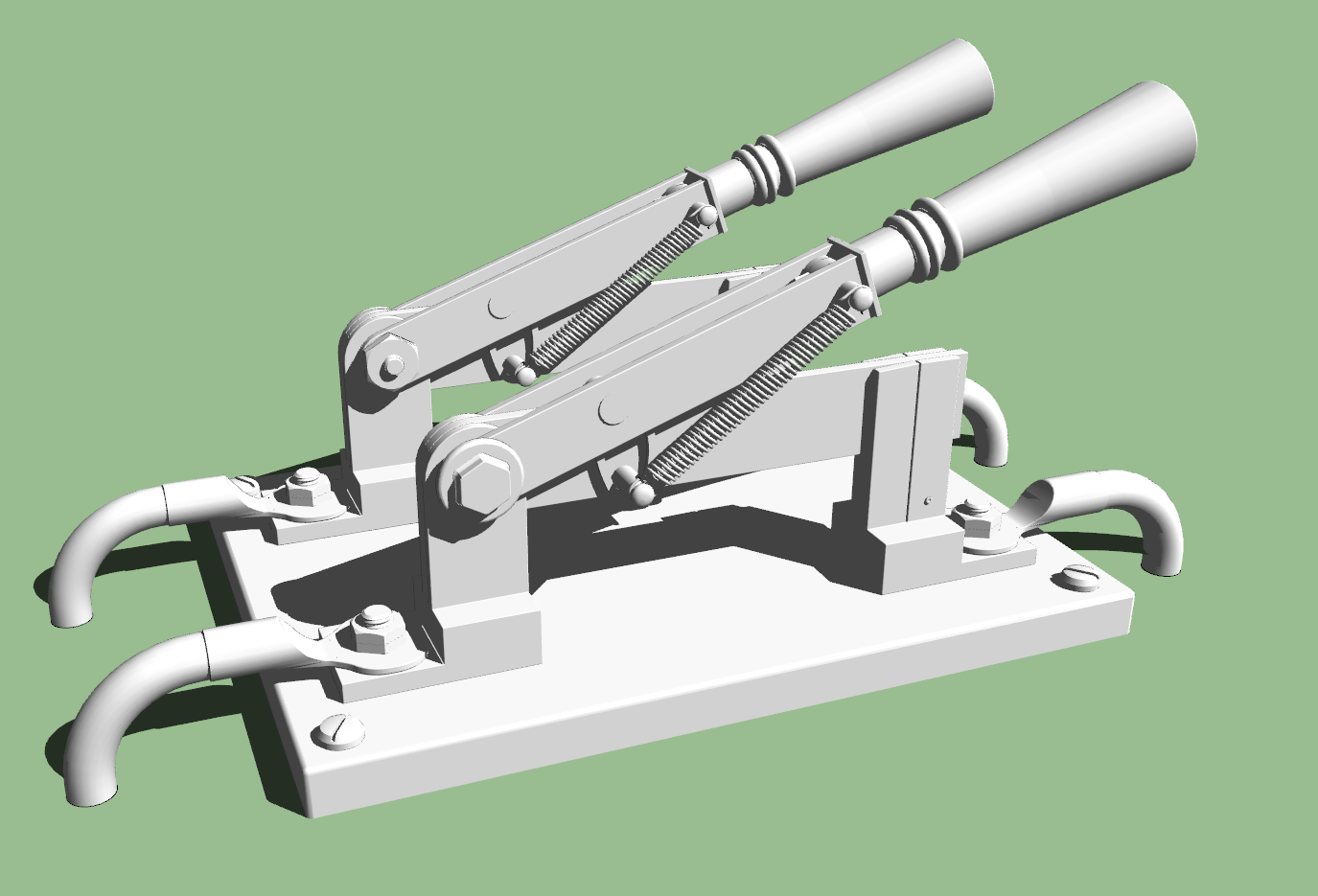
But, just to keep my reputation as a royal pain-in-the-butt alive, I do have a question -- To keep the spring from just raising the blade with the arm, there would have to be tension, or pressure, that holds the blade in place until the arm raises the blade far enuf that it can break free and snap up, right? But, while every blade switch that I have found uses a contact that is formed into a sort of spring shape to ensure good contact with the blade --
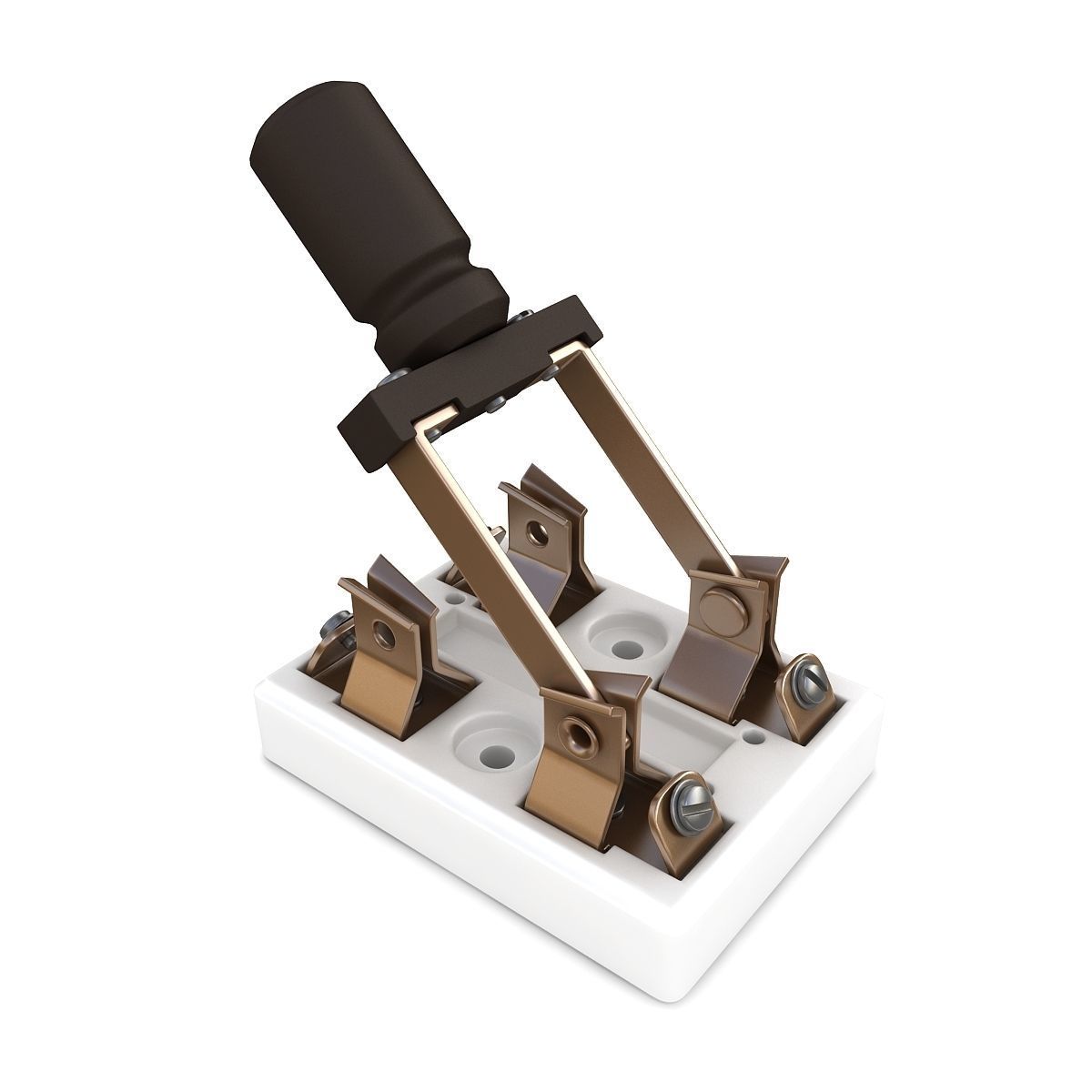
this beast seems to have relatively thick "arms" that stick straight up, and I don't see how they can provide the spring action to ensure good contact, let alone provide enuf pressure against the blade to prevent it from just moving up with arm.Yeah, I'm probably overlooking the obvious again, but my two active brain cells tend to limit my ability to apply logic or see the obvious. Or tie my shoes.
Also can't figure out why they would go to the trouble of cutting the contact down the middle like that. Does that have something to do with it?
Curious minds want to know.
(Sorry I haven't been paying attention to the progress of this thread, but it looks like I may be moving to the Armed Forces Retirement Home in Gulfport, MS soon and there's so much to do. I finally might be getting away from these damned Michigan Winters!!!!!)
-
Good luck with the move Steve, keep us in the loop please.
-
"So, at this point the spring has tension and the red part has made contact with the pin, and further movement of the handle will begin to slide the blade out of its contact. Right?"
[highlight=#ff4040:doulhaql]Yes![/highlight:doulhaql]"But, just to keep my reputation as a royal pain-in-the-butt alive, I do have a question -- To keep the spring from just raising the blade with the arm, there would have to be tension, or pressure, that holds the blade in place until the arm raises the blade far enuf that it can break free and snap up, right?"
[highlight=#ff4040:doulhaql]Yes!, the pressure should ensure for enough friction wen the spring gets loaded to prevent the blade from sliding out of the contact fingers
Whit this design the "red part" slides the blade out off the contact fingers.
Then at some point the blade snaps away from the contact fingers[/highlight:doulhaql]But, while every blade switch that I have found uses a contact that is formed into a sort of spring shape to ensure good contact with the blade this beast seems to have relatively thick "arms" that stick straight up, and I don't see how they can provide the spring action to ensure good contact, let alone provide enuf pressure against the blade to prevent it from just moving up with arm.
[highlight=#ff4040:doulhaql]They somehow can get enough contact pressure wih this design, without enough contact pressure the contact resistance would be to high, and the switch could burn/melt at that place.[/highlight:doulhaql]"Also can't figure out why they would go to the trouble of cutting the contact down the middle like that. Does that have something to do with it?"
[highlight=#ff4040:doulhaql]Yes, this is done to ensure a big enough good contact area, to keep the contact resistance as low as possible
Wider fingers would be more difficult to get them plane to the switch blade[/highlight:doulhaql]About your drawing.
A part of the blade and the top of the fingers should be slightly rounded, to let the blade slide in easier.Some things to read up on the switch topic:
https://phasetophase.nl/kalenders/kalender_2009.html (translate with google)
https://ecprops.com/products/knife_switches/knife_switches.html
http://0330de8.netsolhost.com/test/html/products/knife-switch.phpTogether we have 4 active brain cells

Hopefully the move to your new home goes very well.
-
@mike amos said:
Good luck with the move Steve, keep us in the loop please.
Mike,
Well, after much research and many phone calls it looks like the AFRH is not going to happen. They recently tried to raise the rent for everybody, and that didn't work out very well. Over one hundred people left the home due to the increase, and now they're trying to backtrack on the rent hike to get more people to move in, and it's a big mess. They keep telling me that the rent will stay the same until 2023, but nobody will tell me what will happen after that. Nothing they tell me jives with what I can find on the internet, seems like they are willing to lie to get more people to move in. Bottom line is that I simply cannot trust them now.
That's a shame, I really wanted this to happen. I was stationed at Keesler AFB in Biloxi twice, just a few miles away, and really liked the area (of course that was like 40 years ago, and everything has changed since then, especially after hurricane Katrina pretty much wiped the slate clean in 2005).
But I really do need to get the hell out of Michigan, been here since I retired back in '89 and I cannot put up with the lake-effect Winters here anymore, plus I just don't like the area that much. It's boring. I only chose this area to be close to my brother, and six days after I retired he died of leukemia. Then inertia set in. God (or as I call him "The Cosmic Muffin") really does have a sense of humor, and it's a sick one.
So now I'm looking at other areas. Gotta choose carefully, this is the last move I'm ever gonna make.
Steve
-
@bep said:
"So, at this point the spring has tension and the red part has made contact with the pin, and further movement of the handle will begin to slide the blade out of its contact. Right?"
[highlight=#ff4040:2cbrobxo]Yes![/highlight:2cbrobxo]"But, just to keep my reputation as a royal pain-in-the-butt alive, I do have a question -- To keep the spring from just raising the blade with the arm, there would have to be tension, or pressure, that holds the blade in place until the arm raises the blade far enuf that it can break free and snap up, right?"
[highlight=#ff4040:2cbrobxo]Yes!, the pressure should ensure for enough friction wen the spring gets loaded to prevent the blade from sliding out of the contact fingers
Whit this design the "red part" slides the blade out off the contact fingers.
Then at some point the blade snaps away from the contact fingers[/highlight:2cbrobxo]But, while every blade switch that I have found uses a contact that is formed into a sort of spring shape to ensure good contact with the blade this beast seems to have relatively thick "arms" that stick straight up, and I don't see how they can provide the spring action to ensure good contact, let alone provide enuf pressure against the blade to prevent it from just moving up with arm.
[highlight=#ff4040:2cbrobxo]They somehow can get enough contact pressure wih this design, without enough contact pressure the contact resistance would be to high, and the switch could burn/melt at that place.[/highlight:2cbrobxo]"Also can't figure out why they would go to the trouble of cutting the contact down the middle like that. Does that have something to do with it?"
[highlight=#ff4040:2cbrobxo]Yes, this is done to ensure a big enough good contact area, to keep the contact resistance as low as possible
Wider fingers would be more difficult to get them plane to the switch blade[/highlight:2cbrobxo]About your drawing.
A part of the blade and the top of the fingers should be slightly rounded, to let the blade slide in easier.Some things to read up on the switch topic:
https://phasetophase.nl/kalenders/kalender_2009.html (translate with google)
https://ecprops.com/products/knife_switches/knife_switches.html
http://0330de8.netsolhost.com/test/html/products/knife-switch.phpTogether we have 4 active brain cells

Hopefully the move to your new home goes very well.
Hey Bep,
Really appreciate all the time and effort you have put into setting me straight on this. But for now everything has taken a back seat to other higher-priority things in my life.
Again, many thanks.Steve
Advertisement







